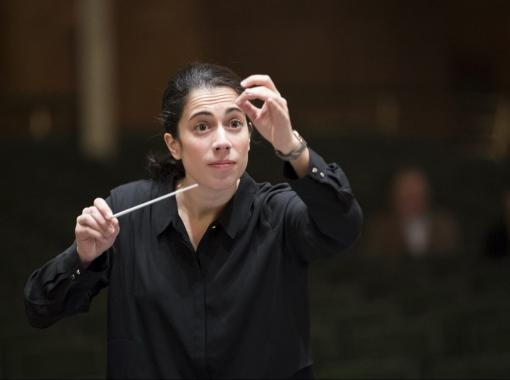The Brno Philharmonic has prepared a French-themed “mini-festival” for this week. Tomorrow it will start with the chamber concert Belle Époque, followed on Thursday and Friday by the concerts Schumann and the Colors of Paris. The orchestra will be led by the young French conductor Marie Jacquot.
“We are delighted to welcome the young French conductor Marie Jacquot, whom we have been seeking for a long time. Her international career is soaring; she has conducted the most important orchestras in Europe, last year she became the chief conductor of the Royal Danish Theater and was also nominated for the Discovery of the Year Award at the International Opera Awards,” said Marie Kučerová, director of the Brno Philharmonic.
Wednesday’s chamber evening is part of the Harmonie of the Brno Philharmonic, eleven players of the orchestra led by clarinetist Emil Drápela. The audience will be transported to Paris at the turn of the 19th and 20th centuries, to the happy period of prosperity in Paris, when all the arts, including music, flourished there, when Impressionism and Art Nouveau asserted themselves against Classicism and musical late Romanticism. “The eminent Parisian musician and teacher Paul Taffanel founded a wind chamber ensemble with paired ensembles at this time, and there was a strong call for new, high-quality wind chamber literature. Many composers listened to him, and we will present four of them at the concert,” said the ensemble’s artistic director Emil Drápela.
The first to respond to Taffanel’s challenge was Charles Gounod with his graceful, elegant and colorful Petite Symphonie. Albert Roussel gave the ensemble the Divertimento, a joyful and idyllic work in which the wind instruments are accompanied by piano. The third piece of the evening will be Vincent d’Indy’s Chanson et danses. Arguably Louis Théodore Gouvy approached the task most distinctively, his Petite Suite Gauloise is the pure essence of French music.
Thursday and Friday will offer comparisons not only of three French composers, but also of different tendencies in 19th and 20th century French music that responded directly to each other: Debussy’s Impressionism was a reaction to the conservatism of the ars gallica, while the music of the Paris Six in turn came to terms with Impressionism. The three French works are not among the most frequently performed, yet they tell us a great deal not only about the styles of the composers themselves, but also about the tendencies mentioned above. “Schumann’s Piano Concerto in A minor, which will also be performed, is, on the contrary, an iconic and famous piece of music from the Romantic period,” said Vítězslav Mikeš, dramaturge of the Brno Philharmonic.
German pianist Markus Schirmer, acclaimed for his charismatic playing and his ability to tell vivid stories through his instrument, will take the solo part. He has been described as the Pied Piper of the Piano... Music that comes straight from the heart, brain and fingertips. For his outstanding artistic contribution Schirmer received the Music Manual Award at the Euromusic International Music Convention, and is also the recipient of one of Austria’s most prestigious awards, the Karl Böhm Prize. He will perform the Brno concert on his own Bösendorfer piano, which he will bring for this purpose.
This week’s French program is the second of three philharmonic “mini-festivals” of the current season. The first of them, at the end of November, was dedicated to Benjamin Yusupov, when five Czech and one world premiere of his works were performed over three evenings, with the personal participation of the composer and partly performed by him. The next mini-festival is scheduled for early March: first, violinist Yumi Hwang-Williams, under the baton of chief conductor Dennis Russell Davies, will perform William Bolcom’s Violin Concerto in D major; the following week, again under the baton of the chief conductor, Milan Paľa will perform Alfred Schnittke’s Fourth Violin Concerto. All three protagonists, accompanied by pianist Katarína Paľová, will meet between these two concerts at the Besední dům, where they will perform, among other things, the second sonatas for violin and piano by both composers.
Concert Belle Époque, Wednesday 19.00 Besední dům
CHARLES GOUNOD Petite Symphonie for wind instruments
ALBERT ROUSSEL Divertimento for wind instruments and piano Op. 6
VINCENT D’INDY Chanson et danses, divertimento for wind instruments Op. 50
LOUIS THÉODORE GOUVY Petite Suite Gauloise for wind instruments Op. 90
Harmonie of the Brno Philharmonic:
Petr Pomkla flute, Anikó Kovarikné Hegedűs oboe, Zdeněk Nádeníček oboe, Emil Drápela clarinet, Stanislav Pavlíček clarinet, Milan Mrazík French horn, David Ryšánek French horn, Dušan Drápela bassoon, Jiří Jakubec bassoon, Dana Drápelová piano, artistic director Emil Drápela
Concert Schumann and the Colors of Paris, Thursday and Friday 19.00 Besední dům
GERMAINE TAILLEFERRE Petite suite
ROBERT SCHUMANN Piano Concerto in A minor Op. 54
CLAUDE DEBUSSY arr. HENRI BÜSSER Petite suite
CAMILLE SAINT-SAËNS Symphony No. 2 in A minor, Op. 55
Markus Schirmer piano, Brno Philharmonic, conductor Marie Jacquot












No comment added yet..